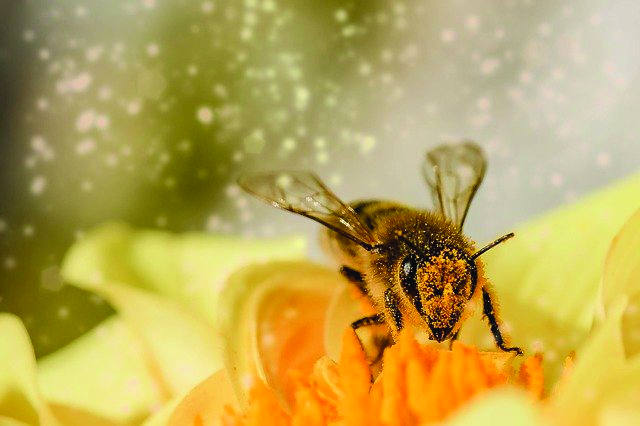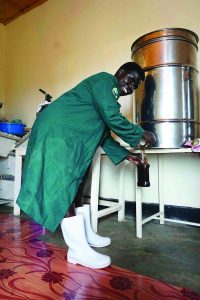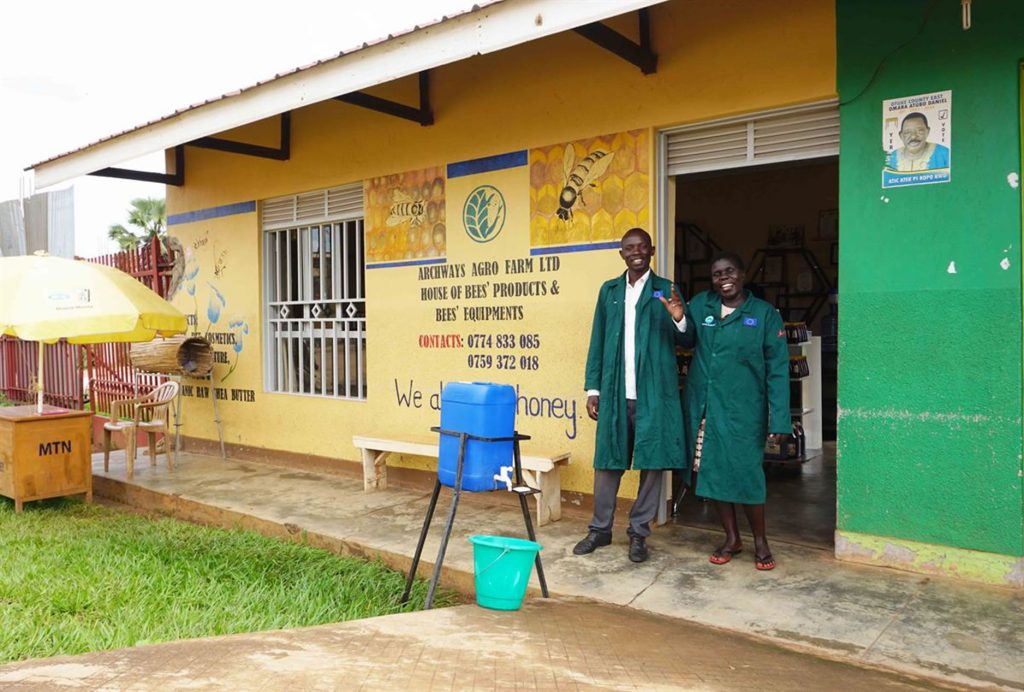Bee keeping in Uganda has taken a huge turn as many farmers are venturing out into it not only for the money but also the health benefits of raising bees. Bees help in pollination which leads to many crops producing fruits. The main reason as to why many farmers keep bees is for the honey and with the readily available market for honey both within and outside Uganda it is one of the farming ventures that you should try out. Prices for honey keep on changing depending on its availability on the market and where you buy it from. At the moment most of the honey is obtained from Arua and it is distributed across the country although there are other areas where bee farming takes place. Below is what you generally need to know about beekeeping in order for it to be successful.

Training for bee farming
Bee keeping, also known as apiculture, is a profitable farming venture that has been well received by many people across the country. The first thing that you should first look into is getting more knowledge about beekeeping, the market for honey and how to care for the bees and other by-products that are obtained from honey. After getting training, you need to start planning on how you are going to manage the farm because planning will either lead to the success or the downfall of the bee farm. Although online training and guides can be of help, it is better if you seek professional help from farmers who are already into the business or from bee keeping professionals so that you get hands on information and how to run the farm on a daily basis.
Site selection for beekeeping
Site selection normally depends on the types of trees that are found in the piece of land you plan on using and its seclusion from people. Beehives are best set up in areas that are not so close to human habitats and the trees where the hives are hanged should at least be nectar producing trees. If the trees do not produce nectar you can as well plant nectar producing plants around the trees where the beehives are kept and some of the plants that you can choose include pumpkins, watermelons, tomatoes, coffee and other legumes.

Capital for the bee farm
After getting the much needed training, you will need to get enough capital in order for you to set up the farm. You will need to acquire the land in case you do not have it already and then start setting up the beehives. Make sure that the beehives are not near the road because this might distort the bees with the unnecessary noise from the cars. The capital will also help you in purchasing the bees and setting up the beehive, hiring workers that will help in the proper management of the farm and purchasing of all the necessary equipment needed for the efficient running of the farm.
Market for the bee products
This is the next step after setting up the farm. There is a ready market for honey across the country but you need to inform your potential clients about the products that you are going to produce and at how much. Once you come to a conclusion with the clients, you will be ready to venture into the bee farming venture and if managed right, you will reap big from the bee keeping.

The requirements that you will need to start bee keeping include the following:
Beehives
you will need to have strong and durable beehives put in a secluded area where human settlement is limited. The beehives act as a home to the bees and some types of beehives that are commonly used in the country include the traditional long hive, the top bar hive and the Langstroth hive. The best hive to use especially when you are starting out should be easy to clean, easy to maintain, a simple design that allows you to easily collect the honey, the brood chambers should be easy to remove and there should be ample space between the supers and brood chambers.
Uncapping fork and bee brush
these are important tools that you will need for inspection of the hive and the removal of cap combs without causing any damage to the combs. The bee brush will help you to clear the bees away from the comb without causing them to become too aggressive.
A bee suit and hive tool
the hive tool will help in removing frames from the hive whereas the bee suit is to make you safe from the bee stings while you collect the honey and inspect the beehives. The bee suit should have a head veil and as you put on the suit, make sure that you put it on top of the gumboots and not tuck it in as this might cause the bees to sting you.
A pair of gloves
this is one of the most essential things that you need when starting up a bee farm. It is advisable that you get the leather gloves to help with cleaning, waxing and caring for the hives.

Immaculate Akullu was nominated Second-Best Farmer in Uganda in 2020. Today, she manages a business that produces 10 tons of delicious honey in one year, and employs 14 young people on the 300-acre farm.
But how did she begin?
As much as Immaculate wanted to start her own honey business, accessing a start-up was far from her imagination. And, when her determination met an opportunity to acquire knowledge, she decided to get the skill. With a small family borrowing of UGX 100,000, the 36 year-old woman ordered 10 kilograms of raw honey from a farm in Lira District, her home area – she was led by her passion for honey even though she lacked a place to retail her product.
With an exceptional willpower she offered cleaning services each morning and evening to a town office, in exchange for a few meter-space at the office veranda, where she displayed her product for sale. Here is where her face began to light up with hope: “I knew I was beginning my journey of success because people loved my honey.” In a week, all her first stock was sold off. She saved the profits and ordered another delivery from the farm. She was now linked to a sales point and a product source, valuing connections within her community, a trait she attests has been central in the growth of her business as long as she was able to keep the pace she had started.
After two years of retail practice, she began to enjoy the progress. She combined efforts with her brother and they opened up a more established honey trade, found a more comfortable shop to sell their product and grew their network of bee farmers, and Archways began!
But something vital was still lacking. Immaculate’s marketing skill was not yet polished, she also lacked equipment for larger production, and her business operated without a license, which was an interference to her plan to penetrate the larger market for honey products. And here is where her partnership with AVSI took a stride. In 2018, AVSI recognized Immaculate’s determination and passion: her business was supported with registration at the Uganda National Bureau of Standards, and equipment such as honey presser machine, 200 kilogram-capacity settling tank, honey refractometer, solar wax extractor, making this collaboration a conduit of inspiration in viable bee-keeping to the local youth of Lira District.
The partnership with Immaculate is one of those strategic relationships AVSI has gained in the interest of creating employment for young people in agribusiness. Opportunities to get involved in this field are rising. Immaculate possesses the right skills in beekeeping and connections with local bee farmers. Her motivational attribute and eagerness to preserve the green economy attract young people – this is one of the reasons she loves bee-keeping. She knows that bee hives have a significant impact on the ecosystem. “Beekeeping is an awesome and fulfilling activity. It gives me a better understanding of the impact bees can have,” she explains.
Her story can be told on and on: through her partnership with AVSI in the project Skilling Youth for Employment in Agribusiness, her company Archways successfully trained 120 young people from three sub-counties in the region, growing her brand name and rousing her to venture into value addition for her produce, making vaseline and other cosmetics.
The youth were also trained in tree planting and they carried on to their home villages for bee keeping. They are excited to join the trade with an assured market for their honey. Immaculate, who needs more unprocessed material to sustain her business, buys directly from them to boost their income, but mostly provides extension services up to their bee farms.

Geoffrey Okello, who was a trainee, says: “I had two apiaries before I was trained by Archways. I kept bees casually. I now know how much money one can earn from this enterprise.” Since then, this computer technician quit his job and he has planted 100 trees in his village: he now boasts 40 apiaries. He meets his family needs comfortably, while mitigating deforestation practices in the Northern part of Uganda. Geoffrey is now 35, he met Immaculate a few years ago and since then they regularly meet to support each other to create change in their community.
Uganda’s population is 74% young people, the majority of whom are unemployed.
Stories of collaborations such as Immaculate’s continue to create meaningful change in the lives of young people and their families.
Thanks to the funding from the Kingdom of the Netherlands and the European Union which respond to the real needs of such populations to assist them become self-reliant through agribusiness while placing climate change at the forefront.



